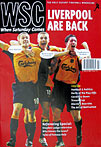 Simon Edwards explains how promotion from and relegation to the Conference is not an improvement for the Football League
Simon Edwards explains how promotion from and relegation to the Conference is not an improvement for the Football League
The prevailing view of relegation to the Conference from the Nationwide League is that it provides an opportunity for a struggling club to rebuild both on and off the field, and eventually return to the fold in rude health. This has always been bunkum. The overall benefits have been negligible.
Automatic promotion and relegation was introduced in 1986 to encourage ambitious clubs outside the League who, it was felt, had experienced a raw deal over the years through the supposed closed shop of re-election. A more sinister motive was to remove perceived “dead wood” from the League. Clubs seen as treading water – fittingly for the times it was seen as a largely post-industrial northern problem, with an isolated case on the English Riviera – were to be replaced by go-getting Home Counties sides like Barnet, Enfield and Wealdstone.
But automatic relegation got off to a bad start. Its first victims were Lincoln City, who had spent most of the previous decade on the fringes of the promotion race in the old Third Division. Since their presence at Valley Parade on the day of the fire they had gone into freefall, being relegated that season. Title favourites for the Fourth Division the following year, they experienced Single Bad Season Syndrome, only hitting rock bottom 15 minutes after kicking their last ball of the season, due to Burnley’s game starting late. For the second successive season they went down on goal difference.
From the beginning, it was difficult to see what a one-up, one-down system could gain anyone. Lincoln, Darlington and Colchester all made quick returns. The club that didn’t was Newport County, who went bust. Barnet and Maidstone joined Scarborough as the only new blood. This trend suggested that at least those clubs that had suffered Single Bad Season Syndrome had the wherewithal to recover. But had re-election been in place, Lincoln, Darlington and Colchester would have retained their status without having to waste time and money in the financially uncertain environment of the Conference; Newport would have been replaced.
As the 1990s progressed the effects of the system became less clear-cut. The relegated clubs, in general, continued to be victims of a chance failure. Sometimes this was due to financial calamity (Chester, Doncaster), sometimes a highly competitive League – Hereford and Scarborough succumbed with generous points tallies (47 and 48). But clubs which struggled often (Torquay, Carlisle) developed a knack of avoiding the drop.
Among the clubs coming up, only in the case of Barnet (1991) and Rushden (2001) has money really told. But what have these new clubs contributed to the League? Wycombe Wanderers have fared best and are now an established Second Division club, with an excellent new ground. But for every Wycombe there has to be a Maidstone. The Kent side lasted three seasons before going bankrupt. They now play in the Kent County League. More recent arrivals Macclesfield, Cheltenham and Kidderminster have all done solidly, though none has benefited the League in terms of their facilities.
Fourteen years on, it seems that the automatic promotion/ relegation system has not been as successful as was hoped. The Nationwide League just has a new plantation of dead wood. Meanwhile, the clubs disappearing into the abyss have done so, more often than not, as a result of a temporary aberration. Their development, contrary to popular opinion, has been hindered by demotion. Immediate problems are a reduction in income and the difficulty of retaining players, both of which are more acute when a professional club drops into what is still essentially a part-time league. Perhaps most serious is the long-term psychological impact of relegation: quite simply a club’s confidence is shot, supporters and all, and it takes years to recover. I speak from experience.
At least the re-election system was a self-regulating one. If a club was not solvent and could not cope with the rigours of League life it either withdrew itself (Accrington Stanley, and later on Aldershot) or had the decision made for it (Workington, Bradford PA). Ambitious clubs were elected to the League: Peterborough, Oxford, Cambridge, Hereford, Wigan, Wimbledon, all between 1961 and 1986. Almost one new club every four years – not as bad a rate as is popularly supposed.
However, if automatic promotion/relegation is here to stay, and one assumes it is, then it is time to take away the risk and insecurity for its victims, and make it three-up, three-down, a promotion system like any other. Oh, and in the meantime, welcome, Rushden & Diamonds, to the family of mediocrity that is the Third Division.
From WSC 173 July 2001. What was happening this month